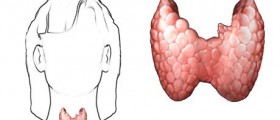
Grave\'s disease is the most common in women aging between twenty and forty years of age, and some of the reasons that may trigger Grave’s disease are pregnancy and family heritage.
Grave’s disease is a rare autoimmune disease, which when triggered attacks our thyroid gland. Thyroid gland is responsible for the production of hormones crucial for growth and metabolism. It is located in the frontal region of the neck, and it uses iodine from our food to manufacture the hormones that our body needs.
The regulation of the metabolism has an important role in our lives. It controls our mood, physical and mental energy, and weight. When Grave’s disease is triggered, the gland starts to overproduce hormone called thyroxin.
As well as some others, the most obvious symptom of Grave’s disease is bulging eyes, and it may seem like a person is staring. It happens because the muscles and tissue behind our eyes swell, due to the gathering of excessive fluids. The eyes may start to feel a bit dry, redness appears and some excessive tearing may be experienced, as well as the swelling around the eyes. Besides these, there are symptoms like limitation of eye movement, double vision or blurred vision, or ulcers on the cornea. In serious conditions the eye nerves can be damaged permanently, and it can lead to permanent blindness. Grave’s dermopathy is a less common symptom, and it is a skin thickening of reddish color, on the shins and the top of the feet.When the thyroid starts to overproduce thyroxin, symptoms start to appear gradually and can easily be mistaken for stress. These are: fragile hair, increased sweating, quickening of pulse, tremors of hands and fingers, heat intolerance, muscle weakness, agitation, loss of sleep, etc.
Our immune system destroys the threats by producing antibodies and white blood cells, and why do they attack the thyroid is still unknown. However, they do not destroy the gland, it simply starts to overproduce thyroxin.
The symptoms vary from individual to individual, that’s why it’s important to undergo the needed tests to diagnose Grave’s disease.
When treating Grave’s disease, modern medicine concentrates on controlling the excessive production of thyroxin, and suppressing the symptoms like increased heartbeat, increased sweating, and anxiety.
Surgery is used in cases where people do not tolerate the medicine needed. Surgical procedure implies the removal of thyroid gland. This means that the person will need supplemental hormones for the rest of the lifespan.
A product that can also help with some symptoms, is actually a herbal remedy, called ThyroSoothe. It consists of two compounds that are mixed in precise amounts to give the best results without any side effects. These are bugleweed, and motherwort.
Advising with one’s doctor is crucial for achieving the best results.

















Your thoughts on this
Loading...